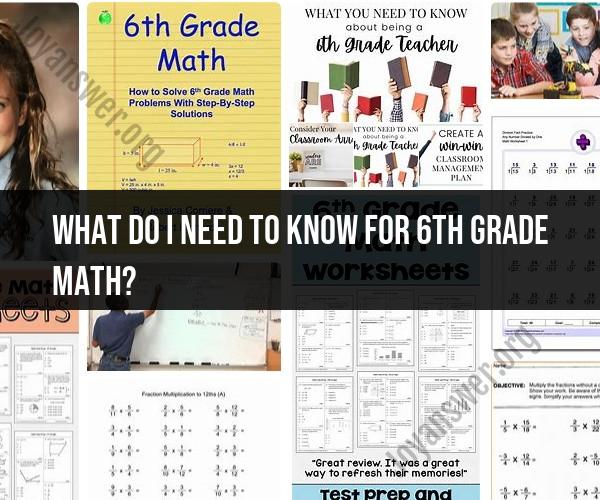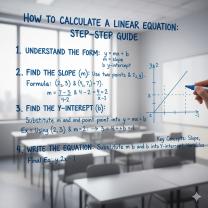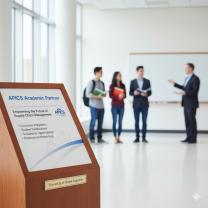What do I need to know for 6th grade math?
In 6th grade math, students build upon the mathematical concepts they have learned in previous grades and begin to explore more advanced topics. Here are some essential math concepts and skills that students typically learn in 6th grade:
Whole Numbers and Operations:
- Understanding and working with whole numbers, including addition, subtraction, multiplication, and division.
- Using the order of operations (PEMDAS/BODMAS) to solve complex problems.
Fractions:
- Comparing, ordering, and simplifying fractions.
- Adding, subtracting, multiplying, and dividing fractions.
- Converting between fractions, decimals, and percentages.
Decimals:
- Performing operations with decimals, including addition, subtraction, multiplication, and division.
- Rounding decimals to a specified place value.
- Converting between decimals and fractions.
Percentages:
- Understanding percentages as a way to express parts of a whole.
- Calculating percentages, including finding percentages of numbers.
- Solving problems involving discounts, sales tax, and simple interest.
Geometry:
- Identifying and classifying two-dimensional shapes (e.g., triangles, quadrilaterals, circles).
- Calculating the perimeter and area of basic geometric shapes.
- Understanding concepts of symmetry and congruence.
Measurement:
- Measuring and converting units of length, weight, capacity, and volume (e.g., inches to feet, grams to kilograms).
- Solving real-world problems involving measurements.
- Understanding the concept of volume and calculating the volume of simple shapes.
Integers:
- Working with positive and negative integers.
- Adding, subtracting, multiplying, and dividing integers.
- Understanding integers on the number line.
Data and Statistics:
- Organizing, interpreting, and displaying data using tables, graphs (bar graphs, line graphs, and histograms), and charts.
- Calculating measures of central tendency (mean, median, mode) and understanding variability (range).
Algebraic Expressions:
- Writing and evaluating algebraic expressions and equations.
- Solving simple one-step and two-step equations.
Ratios and Proportions:
- Understanding ratios as comparisons of two quantities.
- Solving proportion problems.
Probability:
- Understanding basic probability concepts and calculating probabilities of simple events.
- Solving probability problems involving fractions, decimals, and percentages.
Word Problems:
- Analyzing and solving word problems that require mathematical operations and critical thinking skills.
It's important to note that the specific curriculum and pacing may vary from school to school and region to region. Therefore, it's advisable to check with your school or teacher for a detailed curriculum outline and any additional topics or skills that may be covered in 6th grade math. Additionally, practice and regular review of math concepts are essential for success in math class.
Preparing for 6th Grade Math: Essential Knowledge and Skills
Sixth grade math is a challenging but rewarding subject. It is the year when students begin to learn more abstract concepts, such as algebra and geometry. To prepare for sixth grade math, students should have a strong foundation in the following essential knowledge and skills:
- Arithmetic: Students should be able to perform basic arithmetic operations, such as addition, subtraction, multiplication, and division, quickly and accurately.
- Fractions: Students should be able to add, subtract, multiply, and divide fractions. They should also be able to convert fractions to decimals and vice versa.
- Decimals: Students should be able to perform basic arithmetic operations with decimals. They should also be able to understand and use place value with decimals.
- Measurement: Students should be able to measure and convert units of length, weight, and volume.
- Geometry: Students should be able to identify and classify basic geometric shapes, such as triangles, quadrilaterals, and circles. They should also be able to calculate the area and perimeter of these shapes.
Mastering Mathematics: What to Know for 6th Grade
In addition to the essential knowledge and skills listed above, there are a few key concepts and topics that students should focus on in order to master sixth grade math:
- Algebra: Students will begin to learn about algebra in sixth grade. This includes topics such as variables, expressions, and equations.
- Geometry: Students will continue to learn about geometry in sixth grade. This includes topics such as angles, triangles, and quadrilaterals.
- Data analysis: Students will learn how to collect, analyze, and interpret data in sixth grade. This includes topics such as statistics and probability.
A Math Primer for 6th Graders: Key Concepts and Topics
Here is a more detailed overview of some of the key concepts and topics that students will learn in sixth grade math:
- Algebra:
- Variables: A variable is a symbol that represents an unknown value.
- Expressions: An expression is a combination of variables, numbers, and mathematical operations.
- Equations: An equation is a statement that two expressions are equal.
- Geometry:
- Angles: An angle is formed by two intersecting lines or rays.
- Triangles: A triangle is a three-sided polygon.
- Quadrilaterals: A quadrilateral is a four-sided polygon.
- Data analysis:
- Statistics: Statistics is the collection, analysis, and interpretation of data.
- Probability: Probability is the chance or likelihood of an event happening.
If your child is struggling with any of the concepts or topics listed above, there are a number of resources available to help them. You can find math workbooks, online tutoring programs, and even one-on-one tutoring services. With your help and support, your child can succeed in sixth grade math.












